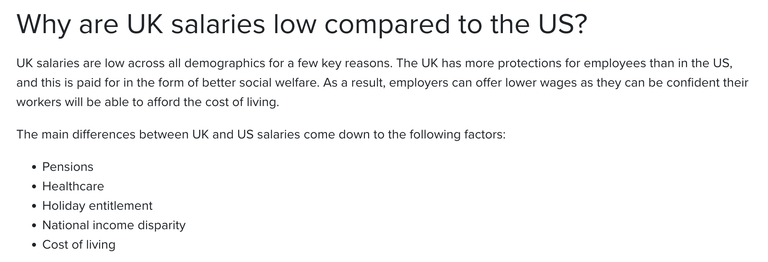Not long ago it was India and Vietnam.
But the UK is fast becoming the main country to which American companies turn when they want to outsource jobs overseas, a trend which has been dubbed 'Britshoring'.
Nearly one in six jobs advertised in the UK so far this year were listed by a company headquartered in the US, with interest from a broad range of sectors, from finance to marketing, from tech to legal.
The rise of remote working, the advantageous time zone, shared language (as long as they get the spelling correct) and cheaper salaries has made us a prime target. Last year the average salary in the US was £46K, in the UK it is £35K.
And the differences get more extreme if you look at salaries in New York compared to London, it costs around twice as much to attract a New Yorker compared to a Londoner, which is saying something given that the cost of living in London is not exactly cheap!
This trend ranges from small businesses to Hollywood giants like Warner Bros. and Netflix. Warner Brothers decided to build a giant studio in Hertfordshire to flim Barbie and Willy Wonka, rather than in California. The less restrictive labour rules in the UK are also a draw.
The British State makes the difference!
The main reason, I think, for this difference, is that British workers get better social benefits. They get FREE healthcare, better holidays and sick pay, and better pensions contributions, thus if you're employed by a British company, they can pay you less because they are contributing to all these other benefits.
Chances are if you're employed by a US company, you will have to pay for some of these benefits of yourself, but of course if you live in the UK you still get the benefit of free health care!

Downsides and final thoughts....
The downsides are that it drains our own home grown companies of talent, while they enjoy higher profit margins!
There's also the fact that the recent UK budget and Trump coming to power may invert this trend, making US workers more attractive once more...?
But for now it's interesting to note this inverse colonial relationship!
Posted Using InLeo Alpha
I hadn't heard this before. Some people think we need to look more to Europe, but I think it was a mistake to break those links. Trump says he wants more US businesses to do stuff in the country, but that will make their products more expensive, even compared to imports with more tariffs. We live in a global economy and have to think beyond our borders.
I actually think the UK budget and election of Trump are likely to accellerate the trend.
The budget is approaching Truss levels of negative impact. Since then, growth estimates have been revised downward, and the return on UK gilts has risen sharply (reflecting the markets demanding better returns to cover the increased risk of default).
The pound has dropped from 1.31 per dollar to 1.26 today which makes employing UK staff even more attractive to US companies. This may be countered if the government goes too far in increasing employee rights, which are already significantly better than their US counterparts.
Trump is reputedly quite pro-British (certainly compared to most US presidents, who tend to talk about their Irish roots - possibly to get the Eastern votes), but how this will stand up to Starmer's seeming determination to move us closer to (or back into) the EU will be interesting to see. If we apply the EU's GPSR's on the whole UK rather than just Northern Ireland, we're likely to see a strong response in the form of US tariffs and sanctions.
Posted using The BBH Project
UK would benefit from pensioner visas like many Latin American countries have. Pensioner's do not take jobs, spend, and are generally less troublesome than younger visitors. And they're generally done having children. The biggest drawback might be use of your NHS, which they could pay into as citizens do. The LATAM countries generally have minimum income requirements for pensioners.
Even within the USA, pensioners tend to move around to places with lower cost of living. Where I live, we have mild winters, if that. We also have a low cost of living given our proximity to Mexico. They'll drive the 1000 miles or more to get here every autumn to winter in a second home. They save on energy from not having to heat their homes. They don't bother with snow. And they are less likely to get winter illnesses. It's worth the journey.
Likewise, arbitrage could make the UK a popular destination for pensioners from the US who are looking for less costly places to visit. I doubt they would winter there. They would more likely stay in villages than large cities. They could largely do this with a full 6 month tourist visa. But these tend to be too restrictive for people who largely don't have an itinerary for their stays.
That's why people over here always relocate to abroad, because of the economical condition but if you look at it in a different angle it's really more stressful over there